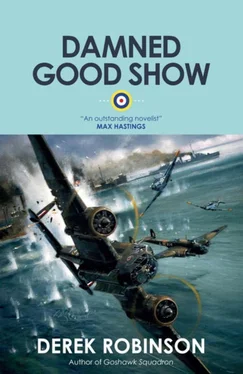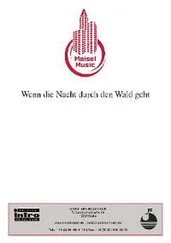The last of his Hampdens touched down at ten minutes to midnight. Some of the gunners were so stiff with cold that they had to be lifted out of the aircraft.
The crews went to interrogation, then to supper, then to bed. Rafferty and Bins strolled to the Mess for a nightcap.
“At least we didn’t lose anyone,” Rafferty said.
“Hell of a long way to go for nothing, sir. Suppose that German fleet was making twenty knots when it was spotted. Could be two hundred miles from Wilhelmshaven by now.”
“You won’t mention that to the chaps.”
“Of course not. The brighter ones know it anyway. They had plenty of time to work it out for themselves, didn’t they?”
4
After a late breakfast, Hunt called a meeting of the crews who had taken part in the operation. He wanted to pool their information. It made a small pool.
Nobody had seen anything. Even if they’d seen a ship, in that lousy weather nobody could have told the difference between a German cruiser and a Swedish freighter. The Bristol Pegasus engines had performed well, thank God. But on such a long flight, navigation had been a mix of faith, hope and guesswork. And the Hampden was an icebox, especially for the gunners. Two hours made them stiff as wood, three hours turned them numb, after four they were in pain, after five… They couldn’t remember how they felt after five frozen hours. They couldn’t remember much of anything.
“None of the other squadrons made contact,” Hunt said. “Not a wasted evening, however. Valuable training, jolly valuable.” He saw that they were not convinced of this. “We got thrown in at the deep end. A night op in stinking weather with orders to hammer the Hun in his backyard, and the war not a day old! You chaps came through with flying colors. All right, that’s all. Carry on, except Pilot Officers Silk and Langham.”
The others left. Hunt picked up two buff files and flicked through their contents. “Luck,” he said. “Do you have any views on luck? You should. It’s lucky for you two this war came along when it did, isn’t it?”
“Sir?” Langham said.
“You’re what, twenty-two? Not many jobs out there for a pair of sacked bomber pilots with no ability except farting about.”
Silk blinked, twice. Otherwise he showed no emotion. He was taller than average and strong in the shoulders, as a good bomber pilot should be. He had dark hair and a clean-cut, open face, the kind that old ladies looked for when they wanted to be helped across a road. Hunt had seen many fools or liars or both with clean-cut, open faces; he disliked Silk and distrusted him. Silk was too well-tailored, his collars were a little too crisp, the thrust of his tie a fraction too dashing. His hair was wavy, which was no crime, but it had a rich, burnished glow that made Hunt suspect excessive brushing. Long ago he had written in Silk’s file: Is this man a bloody fop? Where’s his handbag?
“If you get kicked out, you’ll vanish,” Hunt said. “Into the army, probably. Lose your commissions, of course. Infantrymen. Brown jobs, that’s what you’ll be. Because why? Because we don’t need clowns in the Royal Air Force.”
“Certainly not, sir.”
“Shut up, Silk. Last June, on a navigation exercise, you flew a Hampden under the Tamar railway bridge in Plymouth.”
“Chaps in Fighter Command do it all the time, sir.”
“Don’t bring my squadron down to the level of those playboys, Silk.”
“No, sir.”
“In May, a Hampden beat up a point-to-point in Northamptonshire. Some clown flew around the course and jumped half the jumps. That was you, Langham.”
“Sir, I explained—”
“You invented a bunch of lies. One reason the RAF has always been short of funds for fuel and armaments is clowns like you make idiots of themselves in front of MPs at point-to-points.”
“Yes, sir.”
“And there’s more. Look here: tedious complaints of aircraft playing silly buggers. No proof, but I know it’s you two. And horseplay on the ground, too. God knows that Guest Nights can get a bit wild, but you, Silk, had to pick a fight with an air commodore.”
“He challenged me, sir.”
“He was drunk , Silk. Pie-eyed. Why didn’t you run away?”
“Matter of honor, sir.”
“Matter of a broken arm.” Hunt’s left foot kept kicking his desk. “That man couldn’t play bridge for six weeks. Six weeks. Didn’t stop him signing snotty reports on this squadron. And as for your record of alcoholic excess, Langham…” Hunt glanced at him. Peculiar pair. Silk looked too young, Langham too old. He reminded Hunt of the jack of spades. Black hair, dark eyes, an obvious shadow where he’d shaved. Pity he didn’t act his age. “I haven’t forgotten your obscene behavior with the barmaid and the snake.”
“Allegedly obscene, sir. Case never came to court.”
“Only because Group Captain Rafferty plays golf with the Chief Constable.”
“She was an exotic dancer with a python, sir. They got into difficulties and I tried…”
“Bunkum. Now listen. If this squadron hadn’t had such bad luck with accidents, I’d have kicked you out months ago. And I’d dump you now if it wasn’t for Adolf bloody Hitler. What gripes me is you’ve both got ability. Silk, you should have made flying officer long ago.”
“I’m satisfied with my rank, sir.”
“I’m not. War is good for promotion. Pull your fingers out. You could be flight lieutenants in a year. But for Christ’s sake keep your snotty little noses clean. Now buzz off.”
Another pilot who had taken part in the operation, Tubby Heckter, was hanging about outside the building, playing with the adjutant’s dog. “Cozy chat?” he said.
“Pixie offered me fifty quid to marry his ugly sister,” Langham said.
“He tore you both off a strip. Thought so.” They headed for the Mess, booting an old tennis ball for the dog to chase.
“The Wingco’s trouble is he doesn’t understand us,” Langham said.
“What a shame,” Heckter said. “What doesn’t he understand?”
“Oh, our modesty. Our humility.”
“Not his fault,” Silk said. “He’s thicker than us, that’s all.”
“He can’t be,” Heckter said “You’re one of the thickest blokes on the squadron.”
“I’m not thick. I may be dense, but I’m not thick.”
“Yes, you are, Silko. You’re as thick as fog. Pug Duff said so.”
“Pug Duff? Dear little Pug, who trained with us? If I hadn’t let him sit on my lap he’d never have got his wings. Pug is my biggest fan.”
“You pinched his girl,” Langham said. “He tried to kill you with a hockey stick.”
“Well, my smallest fan, then.”
“You can tell him how much he loves you,” Heckter said. “He’s been posted here. He’s in the Mess now.”
Pug was a nickname. He got it when he was five, on his first day at school, in the playground. He started a fight with a larger boy. Briefly he had the better of it, using fists, knees and feet with a rare ferocity, but he soon exhausted himself. His lip was split and his nose was streaming when a master arrived, grabbed each boy by the ear and dragged them apart. “Enough!” he roared. Duff kicked him on the shins. The master released the bigger boy, who was in tears, and cuffed Duff so hard that his nose sent a splatter of red across the asphalt. Duff tried to punch him in the stomach but his reach was a good twelve inches short. “What a pugnacious child,” the master said. After that, Duff was called Pug.
He was always short for his age, and always getting into fights; perhaps he tried to compensate for size by anger. Usually this kind of behavior gets worn smooth by the friction of the family. Pug Duff had no immediate family. His father had died ingloriously one night in 1917, sitting in a cinema in Amiens when it got hit by a bomb from a German airplane whose pilot was lost, and tired, and decided to jettison his bomb and go home. Captain Duff was in the cavalry, so his death made no difference to the war. It made a huge difference to his widow. She lost her will to live, and the influenza epidemic did the rest. By 1919, young Duff was an orphan at the age of five.
Читать дальше












